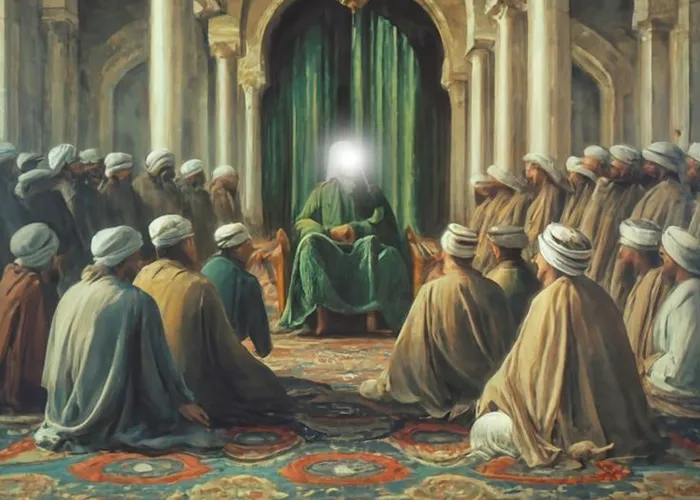Ayah Of The Week – Volume02 Issue08
The Quranic Vision of Social Justice: A Guiding Principle for All
Introduction
February 20th marks the World Day of Social Justice, a time to reflect on the importance of fairness, equality, and justice in society. The pursuit of social justice has always been at the core of the mission of all divine prophets. The Quran emphasises this principle in various verses, including the following one from Surah Al-Hadid:
لَقَدْ أَرْسَلْنَا رُسُلَنَا بِالْبَيِّنَاتِ وَ أَنزَلْنَا مَعَهُمُ الْكِتَابَ وَالْمِيْزَانَ لِيَقُومَ النَّاسُ بِالْقِسْطِ وَ أَنزَلْنَا الْحَدِيَدَ فِيْهِ بَأْسٌ شَدِيدٌ وَمَنَافِعُ لِلْنَّاسِ وَلِيَعْلَمَ اللَّهُ مَنْ يَنْصُرُهُ وَرُسُلَهُ بِالْغَيْبِ إِنَّ اللَّهَ قَوِيٌ عَزِيزٌ
“Indeed, We sent Our messengers with clear proofs and guidance and sent down with them the Book and the Balance, so that humanity may uphold justice. And We sent down iron, wherein is mighty strength and benefits for people, so that Allah may make evident those who support Him and His messengers unseen. Indeed, Allah is Powerful and Almighty.” (Surah Al-Hadid, 57:25)
This verse highlights the fundamental role of divine guidance in establishing justice in human society. In a world where inequalities and injustices persist, the Quranic message remains as relevant as ever. The call for fairness, accountability, and the responsible use of power speaks directly to all members of society—youth, parents, and religious leaders—urging them to be active agents of justice.
Key Lessons from This Verse for Youth
Lesson 1: Living a Truly Religious Life
Being religious is not only about performing acts of worship but also about embodying justice and integrity in daily life. True faith reflects in one’s actions—helping those in need, standing against unfairness, and being honest in all dealings. As young Muslims, you should not only focus on personal development but also strive to improve the world around you through justice and fairness.
Practical Challenge: Reflect on your daily interactions. Have you witnessed an injustice at school or online? Think of one way to stand up for what is right this week.
Lesson 2: Understanding the True Meaning of Justice
Justice does not always mean treating everyone exactly the same. It means giving people what they truly deserve based on fairness and merit. In real life, this means recognising people’s individual needs and ensuring equality in opportunity rather than uniform treatment.
Practical Challenge: Think about how you divide your time, attention, or belongings among your friends or family. Are you being fair in your actions?
Key Lessons from This Verse for Parents
Lesson 1: Practising Fairness at Home
Justice begins in the home. Parents must ensure they treat their children with fairness, avoiding favouritism. A just parent ensures that every child receives attention, guidance, and support according to their individual needs and circumstances.
Practical Challenge: Spend time reflecting on how you handle disagreements between your children. Do you listen to all sides before making a decision?
Lesson 2: Teaching the Value of Justice
Children learn the most from their parents. Talk to them about the importance of justice and fairness in Islam. Share stories from Islamic history that demonstrate fairness and moral courage, helping them internalise these values.
Practical Challenge: Share a real-life example of justice from your own experiences with your children this week.
Key Lessons from This Verse for Imams and Religious Leaders
Lesson 1: Clarifying the Concept of Social Justice
The Quran distinguishes between ‘Adl’ (general justice) and ‘Qist’ (social justice). Religious leaders must educate people about these nuances. They should highlight how justice in Islam extends beyond personal actions to include societal structures and governance.
Practical Challenge: Deliver a talk or a sermon explaining this difference and how it applies to modern society.
Lesson 2: Advocating for Just Governance
A truly just society requires ethical leadership. Imams and religious scholars must highlight the role of governments in establishing fairness. They should encourage young people to be politically aware and actively involved in shaping a fairer society.
Practical Challenge: Organise a community discussion on what Islamic governance means in today’s world and how individuals can contribute to social justice.
Final Thoughts
The Quranic message of justice is timeless and universal. Every individual has a role to play—whether by standing up for fairness, educating the next generation, or leading with integrity. By internalising and practising justice, we can fulfil the divine purpose of establishing a more righteous and compassionate society.
editor's pick
news via inbox
Subscribe to the newsletter.




